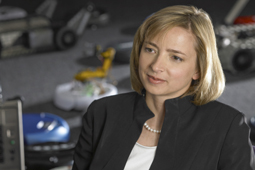Women entrepreneurs making great strides
Women own about 41% of privately held companies but get little venture capital

Helen Greiner
Women entrepreneurs have made great strides in starting their own businesses in recent years, but they confront massive challenges in securing venture capital funding, according to Helen Greiner, cofounder of iRobot and winner of the International Business School's Asper Award for Global Entrepreneurship this year.
Women own about 41 percent of all privately held companies in the United States, according to the Center for Women's Business Research, but women's access to venture capital lags far behind. Only about 11 percent of U.S. firms with venture capital backing in 2009 had current or former female CEOs or founders, according to data from Dow Jones VentureSource.
"Venture capital is very important. The biggest issue entrepreneurs face is funding, and it is harder as a woman to get it," said Greiner who spoke at a panel discussion at the business school featuring prominent women entrepreneurs. Recalling early, meager days of iRobot, she added: "We took very low salaries and ran up a lot of credit card debt. Not having payroll in the bank every month is a drain on your motivation and psyche."
Today iRobot - most famous for Roomba, the autonomous vacuum, and PacBot, a series of military robots stationed in Iraq and Afghanistan -- is worth more than $784 million.
Greiner suggested would-be entrepreneurs take better advantage of networking opportunities with potential mentors and venture firms because access to these groups provides useful vetting of business ideas. Still, she said, most companies don't end up doing exactly what they said they'd do in their business plan.
"They learn from being in business, they learn from their customer base. You always need to do the best thing at that point in time [for your company] even if it wasn't in your business plan," she said.
Greiner spoke on a panel before a crowd of Brandeis students, alumni and officials, including Bruce R. Magid, dean of the business school, and Leonard J. Asper '86, former President of CanWest Global Communications, Canada's largest media conglomerate, who established the Asper Center for Global Entrepreneurship.
Other panelists included Una Ryan, president and CEO of Diagnostics For All, a non-profit that creates low-cost, easy-to-use, medical diagnostics for the developing world, and Daphne Zohar, founder and managing partner of PureTech Ventures, a Boston-based early-stage investment firm that specializes in novel therapeutics, medical devices, and research technologies. Irene Abrams, Associate Provost for Innovation, was moderator.
The discussion covered topics ranging from the kinds of skills that MBA students bring to start-ups, to the defining characteristics of entrepreneurs, to challenges unique to female business owners.
Zohar asserted that the benefits of being a female entrepreneur far outweigh the costs.
"It is an advantage and it is relevant," she said. "It's an opportunity to stand out and do something different. People want to help women entrepreneurs so it may be easier to get that first meeting."
Ryan, a former academic, said: "To be successful, you need two things. You need the right technology -- something that intrinsically lowers the cost of goods. And you also need the right business plan. [You need] something sustainable, something that will outlive you."
She said Brandeis students with a good idea for a business should "Just do it. Get started. And don't give up until you're so wealthy that you can help someone else."
The Asper Award is given annually to an entrepreneur who achieves outstanding success in the global marketplace through creative marketing and business strategies.
Categories: Business, Science and Technology






